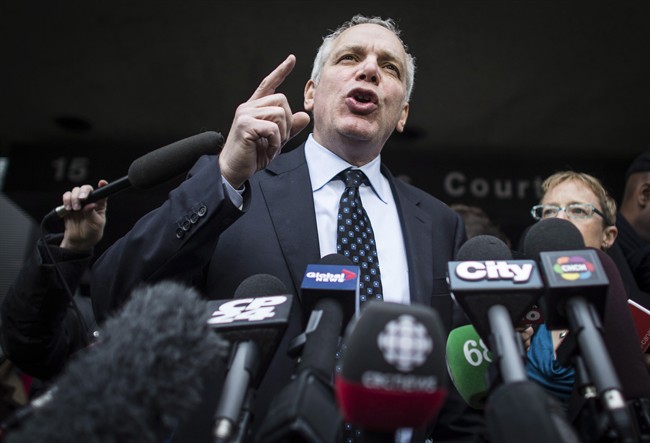THUNDER BAY, Ont. – A long-awaited inquest into the deaths of seven aboriginal youths who moved from their remote reserves in northern Ontario to go to high school in Thunder Bay, Ont., opened Monday following a sunrise ceremony.

In an opening statement to the jury, presiding coroner Dr. David Eden warned of a difficult road ahead.
“We are starting on a long pathway. During that time as we go through this pathway, there will be differences. It’s our job to manage those differences with wisdom, not with anger.”
The inquest, expected to last until next spring and hear from about 200 witnesses – some will testify more than once – is probing the deaths of Jethro Anderson, 15, Curran Strang, 18, Robyn Harper, 19, Paul Panacheese, 21, Reggie Bushie, 15, Kyle Morrisseau, 17 and Jordan Wabasse, also 15.
All died between 2000 and 2011 while, as Eden put it, trying to advance their lives and the well-being of their communities through education.
Six of them went to Dennis Franklin Cromarty High School; the seventh attended the Matawa Learning Centre. Both schools specialize in accommodating aboriginals.
READ MORE: Aboriginal youth share their struggles during Truth and Reconciliation event
Trevor Jukes, counsel to Eden, said the inquest will hear first about Panacheese and Harper, who were found dead in the homes they were staying in. It’s not clear what killed Panacheese, who collapsed at his boarding house.
- Pop-ups and ‘passion meter’: What’s new this year as Leafs, Bruins square off
- Abandoned dogs being found in ‘deplorable condition,’ Brampton warns
- Police watchdog charges Peel officer involved in crash that seriously injured woman
- Ford government divided over Speaker’s ban on keffiyehs at Queen’s Park
Harper was found dead of acute alcohol poisoning in the hallway of her boarding home, the morning after going out drinking with friends. She had been in the city just two days.
The other five victims, Jukes said, were found in rivers in and around Thunder Bay. All had drowned. Alcohol was deemed a contributing factor in four of the deaths.
Lawyer Christa Big Canoe, who speaks for six of the families, said they have been waiting a long time for the inquest to start.
“The families have a lot of questions,” Big Canoe said.
Four women and one man were sworn in as jurors. They will have to decide how each of the deceased died – for example by accident, suicide or homicide. They can also make recommendations aimed at preventing similar deaths, but they will not determine criminal or civil liability, or assign blame.
Julian Falconer, lawyer for the Nishnawbe Aski Nation from whose communities the young people came, praised the “bravery and courage” of the families for persevering to ensure the inquest was called.
“All institutions that are implicated in this have to be accountable and have to fix themselves so this never happens again.”
Eden cautioned Falconer from straying into evidence.
Big Canoe told Eden the relatives were unhappy with the small courtroom.
“It’s terrible that the families of the seven deceased…were put into this tight place,” Big Canoe said. “The families didn’t want to feel as an afterthought.”
Eden said they would move the hearing to a larger room on Tuesday.
The inquest is divided into three phases, starting with the circumstances under which the young people died. It will move next year to broader policy questions and then evidence aimed at formulating recommendations.
Ontario’s chief coroner initially called an inquest into Bushie’s death. Like some of the others, he was found drowned in the city’s McIntyre River in 2007. However, the process ground to a halt in 2008 due in part to a legal challenge related to the lack of aboriginal people on juries that went all the way to the Supreme Court of Canada. The issue was also the subject of a report by former Supreme Court justice Frank Iacobucci.
The inquest, which is being live streamed, resumes Tuesday with testimony from toxicologists.



Comments